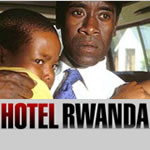Hotel Rwanda (Terry George)
Let’s face it; you’re not going to find a negative review of Hotel Rwanda. This is one of those few films where, given the subject matter, to comment on something like pacing or cinematography just feels wrong, like criticizing Mother Theresa for her dress. This is one of those films powerful enough to reach out to any critic and say, “put the pen and paper down…you’re about to witness something that really matters.”
The true-yet-untold story of Paul Rusesabagina, a hotel manager who housed over a thousand Tutsi refugees during their struggle against the Hutu militia in Rwanda, Hotel Rwanda has garnered widespread and well-deserved comparisons with Schindler’s List.
The difference between these two stories is the small-yet-significant fact that everyone knows about the Jewish Holocaust, but few of us have heard about the genocide in Rwanda that left more than half of the Tutsi population dead while the US and the rest of the world turned a blind-eye.
The plot is simple, Paul (Don Cheadle) is a charismatic hotel manager, a Hutu, married to Tatiana (Sophie Okonedo), a Tutsi. Relations between the Hutu and Tutsi are tense, and the film briefly introduces how colonial rule led to the current situation where, after the Belgians ignored traditional tribal boundaries, they segmented the native population into manageable classes, with the Tutsis ruling over the Hutu.
Now, with the Belgians gone, the Hutus are gaining control. Eventually the genocide begins with armed troops prowling the nation, killing Tutsis.
Luckily, there is a United Nations presence at Paul’s Hotel due to its business of catering to foreigners, dignitaries and diplomats. Col. Oliver (Nick Nolte) contributes another compelling character based on a real-world hero. With little help from the international community, Paul and a number of locals work to save as many as they can, with the constant threat of death looming over their four-star encampment.
During and after the film, my brain could not help but wander to Iraq and to the story our mass media has pushed relentlessly over the past two years: that the reason we’re risking lives and spending billions in Iraq is to “free the people of Iraq from oppression.”
Somehow, the majority of the US population has accepted this story, and the reason so much of us were able to swallow that load?
Because we never heard about Rwanda.
Saddam Hussein’s bloodiest act, According to the U.S. War Crimes Reviews, was the suppression of the 1991 uprising. In just over two months in 1991, Saddam Hussein’s forces killed somewhere between 30,000 and 60,000 Iraqi’s: an act that has been used time and time again as justification for US intervention.
In comparison, in just over two months in 1994, nearly one million Rwandans were hunted down, dragged from their homes and killed. But for some reason, their oppression garnered little attention from the US government.
The fact that this film educates viewers and opens minds to one of the darkest untold stories of recent history is only secondary.
The most important lesson the film teaches us is that anyone can make a difference.
Even if audiences don’t look deeper into the story of Rwanda, or take the opportunity to learn about other unheralded massacres in Somalia, Bosnia, Kosovo or elsewhere, anyone who watches this film will walk away with a reminder that, even in the face of overwhelming despair, one person can have an enormous impact on the world.

